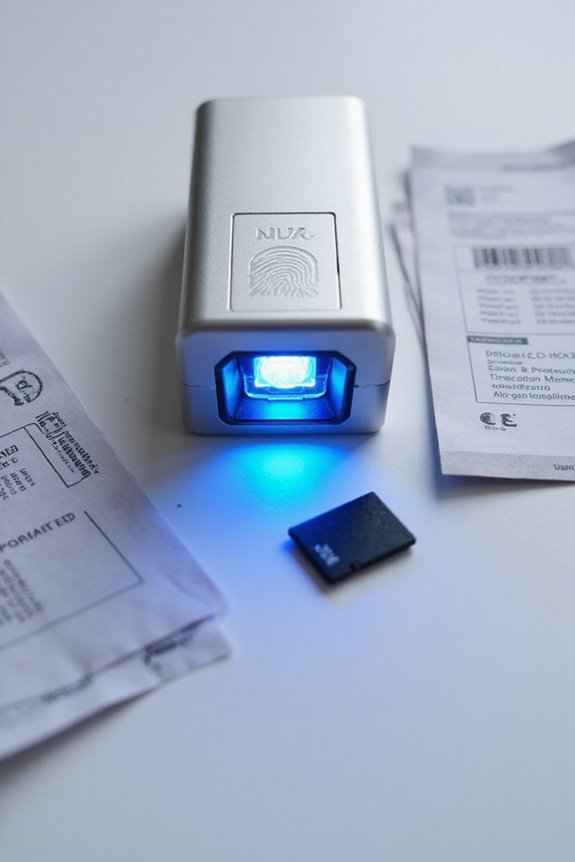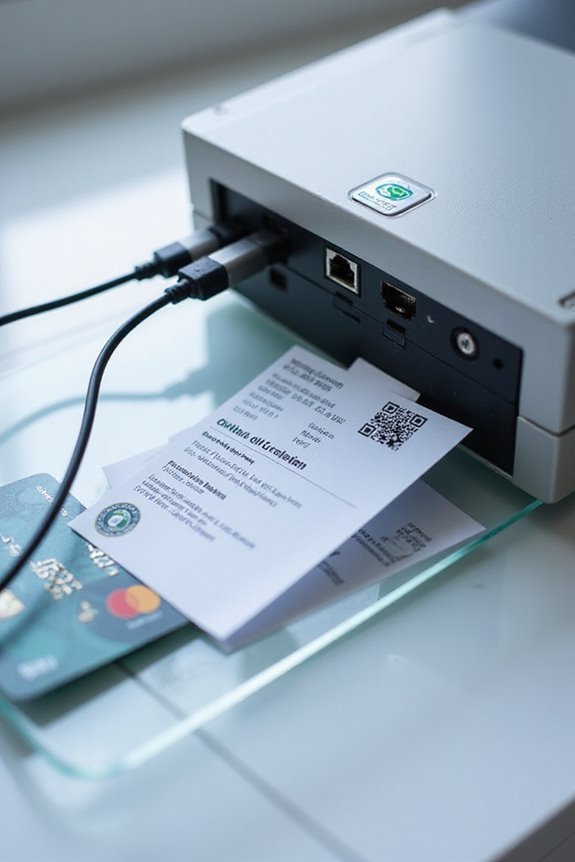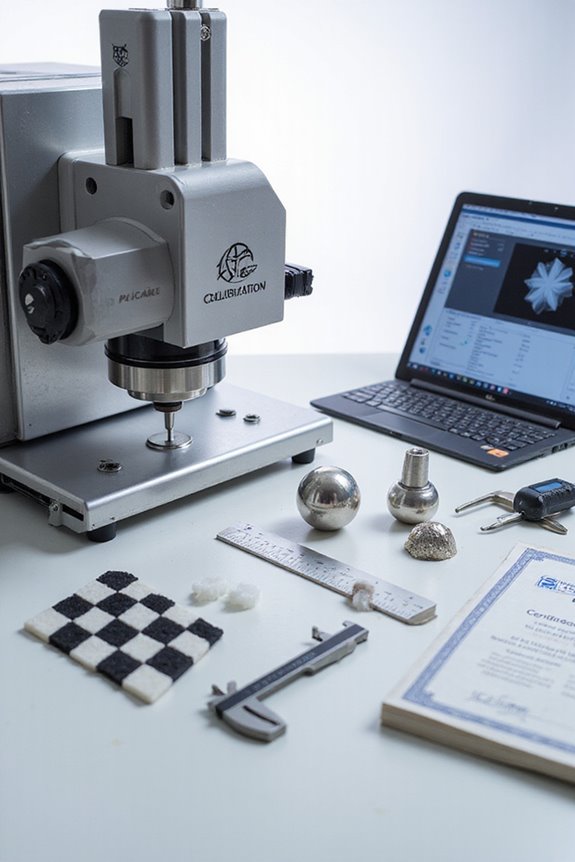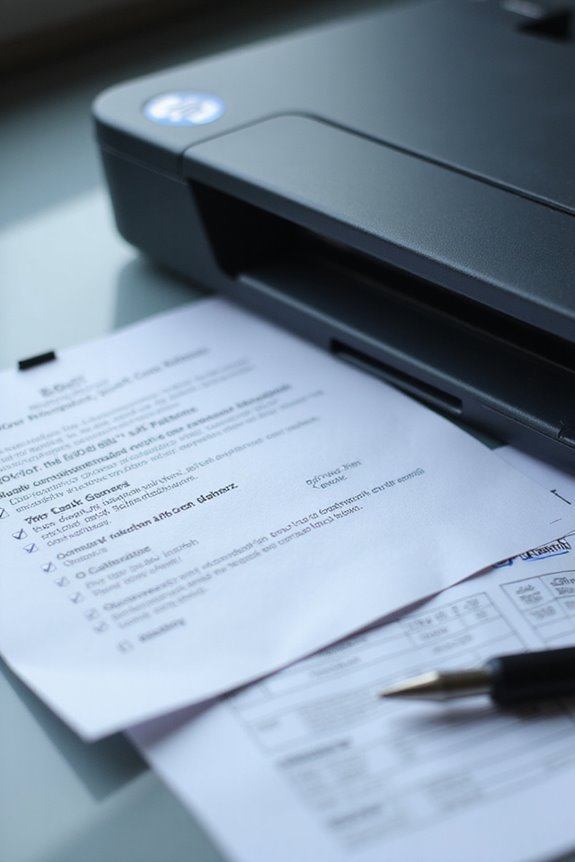To effectively use scanner industry certification standards, we should first grasp the different compliance levels, including biometric and payment card standards. These certifications guarantee reliability and security for both users and data handling. Regular calibration helps maintain precision, while ongoing maintenance keeps our credentials valid. By adhering to these standards, we can enhance service quality and build client trust. Continue exploring to discover more on how these standards can elevate our scanning capabilities.
Key Takeaways
- Familiarize yourself with the technical specifications outlined in certification standards to enhance scanner performance.
- Ensure compliance with security protocols to protect sensitive scanned data from breaches.
- Regularly calibrate scanners following authoritative reference standards to maintain measurement accuracy and reliability.
- Stay updated on certification requirements and industry standards for ongoing professional credibility and service quality.
- Participate in industry events to engage with evolving scanner technologies and foster innovation in practices.
Understanding Industry Certification Standards
When we think about industry certification standards, it’s essential to recognize their role in guaranteeing the quality and reliability of scanners across various applications. These standards define technical specifications that enhance scanner performance, making certain devices operate consistently and effectively. Certification also includes security protocols to protect scanned data, which is vital in today’s digital landscape.
Various organizations issue certifications tailored to specific technologies and industries, such as biometric and document scanning. By adhering to these standards, manufacturers enhance data security through mandated encryption and authentication methods, fostering user trust. Ultimately, compliance not only improves device functionality but also bolsters market acceptance, giving users confidence in their investments. Understanding and utilizing these standards helps us guarantee our scanners meet both performance and security expectations. Additionally, selecting scanners with strong security features can significantly mitigate risks associated with data breaches and unauthorized access.
Biometric Scanner Certification Compliance

Certification compliance for biometric scanners is essential for guaranteeing reliability and security in various applications. When we consider biometric device compatibility, certified scanners—like fingerprint and iris devices—assure seamless integration with systems such as India’s Aadhaar. The certification process overview involves rigorous testing to assess image quality and performance, often requiring resolution standards of 500 ppi or higher. Additionally, devices must securely manage encryption keys, with compliance levels impacting how well they protect sensitive data. Each certified scanner features unique identifiers that enhance device authentication and traceability. By meeting these detailed criteria, we can confidently utilize certified biometric scanners to prevent fraud and guarantee the accuracy of biometric matching, promoting a secure environment for users. Furthermore, OCR technology plays a crucial role in ensuring that scanned images are converted into editable formats, aiding in the management and retrieval of biometric data.
Payment Card Industry Scanner Certification Requirements

Understanding Payment Card Industry (PCI) scanner certification requirements is crucial for companies transmitting cardholder data securely. There are four compliance levels that we must consider based on transaction volume and risk, from Level 1, which includes over 6 million transactions annually, to Level 4, involving fewer than 20,000 online transactions.
We need to adhere to 12 core requirements, like securing networks and protecting cardholder data. Scanners must also integrate stringent security protocols, including encryption and regular vulnerability assessments. Additionally, ensuring compliance with HIPAA regulations is vital for protecting sensitive patient data in healthcare settings.
To maintain compliance, ongoing monitoring is essential, and obtaining PCI DSS certification helps us demonstrate our commitment to secure payment processing. By doing so, we can appreciably reduce fraud risk and enhance customer trust in our systems.
Calibration and Certification for Industrial 3D Scanners

Calibration for industrial 3D scanners is essential to confirm that we achieve accurate and precise measurements, which directly impacts our operational efficiency. Regular calibration affirms that our scanners align with authoritative reference standards. Utilizing effective calibration techniques, we fine-tune each scanner’s optical subsystems, compensating for geometric imperfections and confirming accuracy verification against certified objects. This process not only improves measurement reliability but also adheres to standards like ISO 9000, promoting compliance for our operations. By performing routine checks and adjustments, we can minimize measurement uncertainty and maintain industry credibility. Vendors often offer proprietary calibration services, so we should verify their capabilities to confirm our scanners are performing at their best and delivering the precision we rely on. Additionally, understanding scanning precision levels is crucial as it impacts the detail and usability of 3D models in various applications.
Steps to Achieve Scanner Certification

To achieve scanner certification successfully, we need to follow a structured approach that assures compliance with industry standards. First, we must complete the scanner application, guaranteeing all administrative and technical details are accurate. After submitting, we’ll wait for the governing body’s review. Upon acceptance, we’ll sign a Test Agreement and prepare for testing procedures, providing a description of our scanning processes. Next, we’ll undergo a rigorous scanning test, demonstrating our proficiency in identifying vulnerabilities. Post-test evaluations will validate our results. Upon successful completion, we’ll receive our certification, which includes relevant metadata. Finally, we should maintain our certification through regular updates and verification to guarantee ongoing compliance and credibility in our industry. Additionally, achieving certification may require demonstrating adherence to specific security measures implemented to protect sensitive data during scanning processes.
Benefits of Compliance With Certification Standards
When we embrace compliance with scanner certification standards, we release a range of significant benefits that enhance our operations. To begin with, certified products build customer confidence, showcasing our commitment to quality and security. This adherence to standards not only boosts our reputation among stakeholders but also attracts clients who prioritize certified compliance in their purchasing decisions. In addition, these certifications support effective risk management by incorporating advanced data protection measures and ensuring we meet legal standards like HIPAA and GDPR. They also provide operational efficiency through standardized workflows and automated compliance checks, reducing potential errors and risks. Ultimately, by aligning with certification standards, we position ourselves as responsible and trustworthy partners in the scanner market. Furthermore, compliance with these standards ensures that our products utilize advanced data protection measures, which can significantly enhance our operational security.
Key Considerations for Ongoing Certification Maintenance
Maintaining ongoing certification is essential for sustaining our expertise and operational integrity in the scanner industry. To guarantee our credentials remain valid, we must complete mandatory continuing education requirements, like accumulating 60 contact hours every three years. Engaging in skill assessments helps us identify knowledge gaps, keeping our abilities sharp. Regular participation in certification audits verifies that we follow necessary guidelines, maintaining compliance. Plus, staying updated with the latest scanner technology solidifies our competitive edge. We should meticulously document our professional development activities and adhere to renewal deadlines. Each of these considerations not only reinforces our credentials but enhances our overall effectiveness in delivering high-quality service in scanner diagnostics. Embracing these practices keeps us at the forefront of the industry.
Frequently Asked Questions
What Are the Costs Associated With Obtaining Scanner Certifications?
When considering certification fees, we’ll encounter costs like initial training, renewal, and potential exam retakes. Understanding these expenses helps us budget effectively while ensuring compliance and maintaining our credentialed status in the industry.
How Long Does the Certification Process Typically Take?
The certification timeline usually spans several weeks to a few months. We’ve found that testing duration is influenced by product complexity, documentation accuracy, and the availability of testing labs, affecting overall certification speed considerably.
Are There International Scanner Certification Standards Available?
Yes, there’re international scanner certification standards established by various certification organizations. These standards guarantee quality, safety, and compliance, facilitating the reliable use of scanners in diverse applications, enhancing our confidence in their performance globally.
What Happens if a Scanner Fails Certification Testing?
Imagine a world where our scanners fail certification tests; these failure consequences can be significant. We’ll face compliance setbacks and potential loss of trust. Steering through the certification process properly is essential for our success.
Can Certified Scanners Lose Their Certification Status?
Certified scanners can lose their certification status if we neglect certification maintenance or fail compliance audits. It’s essential to regularly update software and guarantee proper use to maintain our scanners’ certifications and avoid operational disruptions.





